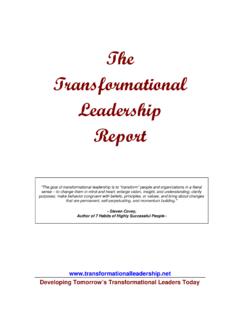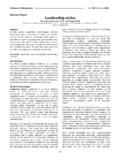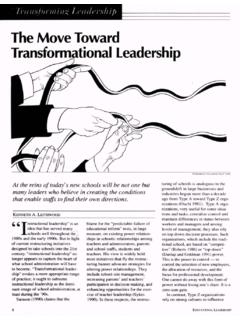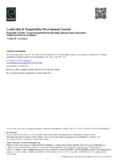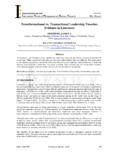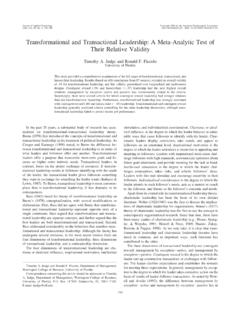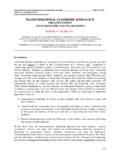Transcription of Knowledge Management and Transformational …
1 Knowledge Management and leadership 1 Running Head: Knowledge Management AND leadership EXPLORING THE RELATIONSHIP BETWEEN Knowledge Management AND Transformational leadership C. B. Crawford, Fort Hays State University 600 Park Street Hays, KS 67601 (785) 628-5550 ABSTRACT As we move rapidly into the 21st century leaders face the challenge of being effective in a global Knowledge environment. Now, more than ever, leaders must play the key role in helping organizations cope with the challenges they face from expanding Knowledge and Knowledge systems. This study (N = 845) investigated the relationship between Transformational , transactional, and laissez-faire leadership and Knowledge Management .
2 Knowledge Management behaviors were a predictor variable for Transformational leadership , and a negative predictor of laissez-faire leadership . Knowledge Management behaviors was not related to transactional leadership overall, but was related to each subscale. This finding warrants further investigation. Implications for leadership educators are discussed. Knowledge Management and leadership 2 INTRODUCTION Nearly every modern organization is confronting the change in information systems, from ledger cards to a digital era. Today, information flows in directions and with speed that only 10 years ago we could not even imagine. The change has been nothing short of a revolution. This trend toward informatics effects the process of leadership by speeding up the inputs, requiring faster and more personal transformation of the product, all in a business climate that builds competition through response time to customer demands.
3 To be certain, the role of leaders in the short-term future is impacted by the current information revolution. Additionally, the information age has put great pressure on organizational outcomes. Just in time solutions have replaced on hand inventory, and product quality is more important than ever before. One of the most serious issues facing the modern organization comes in the form of an uncertain future and a rate of change that seems staggering today, but will only geometrically intensify as information systems become widely instituted. In short, the modern organization is forced to produce something faster than ever and better than ever for a rapidly evolving market. AN EMERGING Knowledge ORGANIZATION Over the past 15 years the term Knowledge Management has evolved to represent the changing nature of the workplace a true paradigm shift.
4 In coining the phrase Knowledge society Peter Drucker convincingly argued that land, labor, and capital the classical factors of production had been largely replaced by Knowledge (Drucker, 1993), that Knowledge has become the resource, rather than a resource, is what makes our society post-capitalist (p. 45). The modern Knowledge organization has become a social environment designed by the specialists, to meet the needs of the market and the specialists, in the most efficient and quickest way possible. Lang (2001) clarified the importance of the Knowledge worker in this new age, while the Knowledge worker may need the tools of production the organization owns, while she may well have to work in organizations, she nevertheless owns the means of production (p.)
5 44). Hitt (1995) further argued, It seems evident that the learning organization is a paradigm shift from the more traditional organization. Indeed, it is a paradigm shift of the highest order. We are witnessing the emergence of a radically new perspective of organization: how they should function, how they should be managed, and how they should cope with change (Hitt, 1995, p. 17). Rowley (1999) suggested that the Knowledge based society has arrived, and those organizations that can succeed in the global information society are those that can identify, value, create, and evolve their Knowledge assets (p. 416). Rowley continued by noting that effective Management of Knowledge , change, and innovation are central or core competencies that must be mastered for organizations to succeed.
6 Neef (1999) expanded the more micro-level view of Knowledge Management by commenting, A Knowledge -based revolution is taking place, and it comes in a matching set: Knowledge Management for organizations and the Knowledge -based economy for nations themselves. Both are part of a major evolutionary economic movement which is beginning to reshape the global economic structure, and Knowledge Management should be seen as one of the most concrete and important set of practices and policies than an organization can adopt, marking a significant step in an enterprise s evolution toward becoming a global, learning organization that can survive in the Knowledge based economy (p. 72). Knowledge Management and leadership 3 BASICS OF Knowledge Management As a preliminary consideration, it seems important to define the seemingly self-evident term Knowledge .
7 While prima facie it seems obvious, the reality is that Knowledge is quite complex (Clark & Rollo, 2001). Of central importance is the type of Knowledge that organizations are forced to manage. If all Knowledge were codified and formal, or explicit, then the function of Knowledge Management would be little more than compliance and Management . Nevertheless, the reality is that much of the information that organizations try to manage is held within the personal and collective experiences of the workforce; it is tacit Knowledge . Bollinger and Smith (2001) explained, Tacit Knowledge is unarticulated Knowledge that is in a person s head that is often difficult to describe and transfer. It includes lessons learned, know-how, judgment, rules of thumb, and intuition it is key characteristic of team-based learning organizations (p.)
8 9). Further clarifying this point, Lang (2001) stated that, Knowledge is both produced and held collectively rather than individually in tightly knit groups or communities of practice organizational Knowledge is social in character (p. 46). Tacit Knowledge is an important resource of organizations given that 42% of corporate Knowledge is held within employee s minds (Clarke & Rollo, 2001). Knowledge Management is jointly a goal and a process. As an outcome or goal, Knowledge Management is entirely focused on sharing information for the benefit of the organization, as Bollinger and Smith (2001) concluded. They reasoned, the Knowledge Management process is not so much about control as it is about sharing, collaboration, and making the best possible use of a strategic resource (p.
9 14). Explicit Knowledge is generally easy to access and manage, but tacit Knowledge often defies capture given its highly personal and subjective, but critical, nature. Knowledge Management is primarily about making tacit Knowledge more accessible since it accounts for a majority of an organization s collective Knowledge (Clarke & Rollo, 2001). Lang (2001) explicated the goal of Knowledge Management , Knowledge Management systems must connect people to enable them to think together and to take time to articulate and share information and insights they know are useful to their company (p. 44). Stonehouse and Pemberton (1999) also suggested, it is the role of Knowledge Management to ensure that individual learning becomes organizational learning (p.
10 132). Birkinshaw (2001) referred to this process as recycling old Knowledge . Knowledge Management is a complex process without end, but effective Knowledge Management can be a goal for any organization. The process of Knowledge Management is based on the ability of all members of the organization to add value to the basic business processes through the creation, communication, codification, and coordination of both explicit and tacit Knowledge stores (Nonaka & Takeuchi, 1995). Specifically, Nonaka and Takeuchi (1995) theorized that the flow of Knowledge transitions from socialization, to externalization, to combination, and finally to internalization basically from the raw experience, to understanding, then to categorization, and finally to the creation of personal mental models that transcend the experience.




